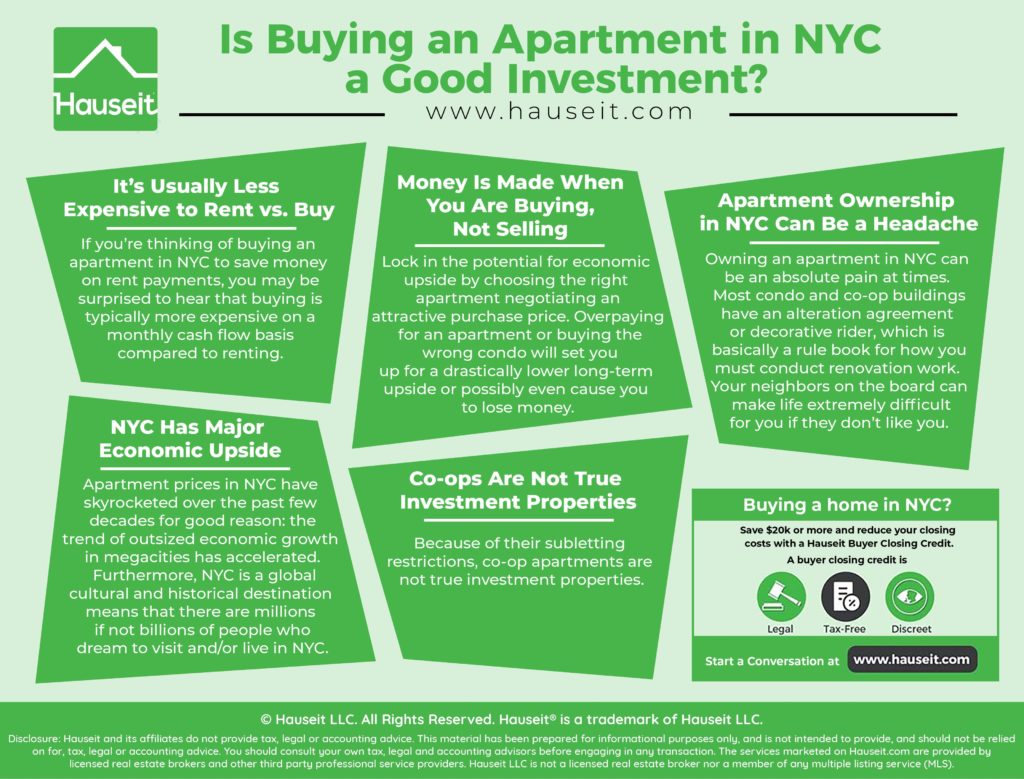Is buying an apartment in NYC a good investment? There’s a common misconception among New Yorkers that buying an apartment in NYC is always a good investment. While buying the right apartment can offer you the prospect of a long-term financial windfall, choosing the wrong apartment in NYC carries risks which can end up costing you major time and money.
So, is buying an apartment in NYC a good investment? The real answer is that it depends on the apartment you buy and your personal financial situation. In this article, we discuss the key talking points related to the question of whether buying an apartment in NYC is a good investment.
Table of Contents:

If you’re thinking of buying an apartment in NYC to save money on rent payments, you may be surprised to hear that buying is typically more expensive on a monthly cash flow basis compared to renting.
In most cases, your monthly mortgage and apartment maintenance/common charge payment plus taxes will be slightly higher than what you’d pay to rent the same apartment.
Finding apartment in Manhattan whose monthly mortgage payment is less than the monthly rent is the equivalent of finding a needle in a haystack.
In a best case and highly fortunate scenario, your total monthly payment will be approximately equal to the rent you can earn on the apartment.
The reason why it’s more expensive to buy vs. rent in NYC is because of the fact that Manhattan and NYC apartments have global demand, and this has resulted in sky high prices. A higher price lowers the investment cap rate on an apartment.
Fortunately, a simple cash flow analysis ignores all the other benefits of home ownership/investment which include tax deductions, capital appreciation and the benefit of portfolio diversification.
Our Discretion, Your Advantage
Our traditional partner brokers never openly discount which means less disruption and better execution for you.
Prudent real estate investors make money when they buy, not when they sell. Another way of saying this is that you lock in the potential for economic upside by choosing the right apartment negotiating an attractive purchase price.
Overpaying for an apartment or buying the wrong condo will set you up for a drastically lower long-term upside or possibly even cause you to lose money.
When a neighborhood becomes hot, buyers tend to ignore other equally interesting areas and bid up the prices in that one specific neighborhood.
This results in a situation where the prices in one neighborhood are unjustifiably higher than prices in other neighborhoods.
A prudent buyer is able to identify the neighborhoods which have higher relative value and consequentially more upside.
Here’s a good example: if you purchased a $1m condo in the Lower East Side in 2014 and sold it in 2018, you would have made significantly more money than if you purchased a $1m condo in Chelsea.
This is arguably because Chelsea prices rose much faster in prior years, creating an environment where the pricing differential between the two neighborhoods was unjustifiably wide.
Another way to overpay or lose money is to buy a ridiculously expensive new construction condo. While it’s by no means the case that all new developments are bad investments, some are far more attractive than others.
For example, does it make sense to pay $2,500 a square foot for a new construction condo when there’s an existing construction condo for sale a few blocks away for $1,800 PPSF? It would only make sense to buy the new construction condo with this sort of pricing if you’re adamant about living in a brand new, luxury unit in a full-service condo building.
Save 2% On Your Home Purchase
Save thousands on your home purchase with a buyer agent commission rebate from Hauseit
Owning an apartment in NYC can be an absolute pain at times. Let’s say you buy a condo and you want to have it painted. What seems like a minor project can turn out to be a huge headache if your condo board or neighbors don’t like or respect you.
Most condo and co-op buildings have an alteration agreement or decorative rider, which is basically a rule book for how you must conduct renovation work.
If provoked, your neighbors can force you to go through numerous hoops before you’re allowed to do even the smallest amount of work to your apartment.
First, they’ll ask you to fill out the alteration agreement.
You’ll have to sign a bunch of documents, prepare a large amount of paperwork and pay your building and/or managing agent $1,000 or more in application fees.
Now comes the waiting game.
What if your Board President doesn’t like you, or his apartment is right below yours and he doesn’t want any noise? He could conceivably take weeks and weeks to review and approve your renovation plans. He may simply ignore it and say that he forgot.
All you can do is email the Managing Agent, and they can’t do anything until the Board responds. Sadly, there’s nothing you can really do about it.
If you try to do any work without following these steps, you may receive knocks on your door from angry neighbors or board members who will try to police your behavior.
In some cases, your neighbor may even report you to the Managing Agent without even giving you the courtesy of a phone call beforehand.
What’s worse? The fact that many of the neighbors who may report you will have already completed noisy gut renovations of their own apartments in the past!
Co-ops are even worse.
Co-op apartments are far worse, as the board can reject your potential buyers as part of the coop board application process without giving you any reason.
This can cost you major money when it comes time to sell your co-op apartment. Let’s say you are trying to sell in a falling market. You found a buyer and signed a contract for a sale price of $1.5m. It takes 6 weeks for the buyer to submit the application and complete the board interview, at which point the board rejects the buyer.
By the time you relist your apartment, the market has fallen further and you’re forced to reduce your asking price by $125,000 to $1,375,000. In this example, your own neighbors caused you to personally lose $125,000 or more and many months of your life. What’s the worst part about this?
The fact that the board could have rejected the buyer for a petty reason, such as not liking the person or being concerned that the buyer may do renovations which would disturb the neighbor (who is the Board President).
Apartment prices in NYC have skyrocketed over the past few decades for good reason: the trend of outsized economic growth in megacities has accelerated. With the growth of the service and technology sectors, people continue to gravitate towards large cities which offer strong economic prospects.
Combining this trend with the fact that NYC is a global cultural and historical destination means that there are millions if not billions of people who dream to visit and/or live in NYC. One could argue that owning an apartment in NYC (or London) is the ultimate global status symbol and reflection of absolute success.
Looking ahead, the global and national appeal of living in NYC appears to be strengthening even further. This will continue to push prices higher, first in Manhattan and subsequently in other boroughs. While Manhattan typically leads the pricing curve in NYC, there are often imbalances from time to time where certain neighborhoods offer better short and medium upside compared to Manhattan.
A Full Service Listing for 1%
Sell your home with a traditional full service listing for just one percent commission.
Because of their subletting restrictions, co-op apartments are not true investment properties. With that said, buying a co-op apartment might still be worth it if you find a good deal and plan on living in NYC for the immediate future.
As we explain here, co-op apartments are typically 10% to 40% less expensive than comparable condos. Furthermore, the vast majority of apartment inventory in NYC consists of cooperative buildings. Co-ops are usually the best investment for someone who is buying a primary residence, because you can get more for your money.
There are numerous downsides to buying a co-op despite the fact that you get more space compared to a condo apartment. Co-ops may have subletting restrictions, strict house rules, a seller flip tax, onerous buyer financial requirements and nosy neighbors.
Disclosure: Hauseit® and its affiliates do not provide tax, legal, financial or accounting advice. This material has been prepared for informational purposes only, and is not intended to provide, and should not be relied on for, tax, legal, financial or accounting advice. No representation, guarantee or warranty of any kind is made regarding the completeness or accuracy of information provided.






